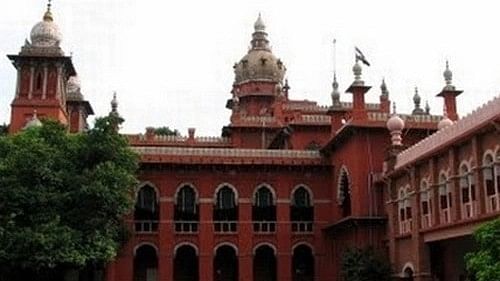
The Madras High Court.
Credit: PTI File Photo
Chennai: The Madras High Court has observed that the barriers faced by persons with disabilities go beyond just physical accessibility issues, extending to deep rooted prejudice, stereotypes and misconcepts that pervaded many aspects of the society.
Justice N Anand Venkatesh made the observation in a recent order while allowing a petition from B Vidyasagar, Assistant Engineer, Tamil Nadu Housing Board, a disabled person, seeking a direction to the authorities not to insist him to produce the certificate of passing the Tamil Language Test in the light of a G.O dated May 23, 2022 and to grant pending increments and promotion.
The judge said from education and employment to health care and public services, persons with disabilities often face significant obstinance that hinder their full participation and inclusion. In view of the same, a Constitutional Court must develop an understanding of the societal, attitudinal, cultural, institutional, structural, legal and environmental barriers that persons with disabilities encounter daily.
The Constitutional Court must strive to remove these barriers through their Rulings, the judge added.
Citing a judgment of the Supreme Court, the judge said it was clear from the apex court ruling that failure to provide reasonable accommodation to persons suffering from peculiar disability will result in a clear discrimination shown against them and which has to be rectified by a Constitutional Court.
The judge said in order to fulfill the above requirement, various judgments have been passed by the SC which has been followed by the High Courts to ensure that a person suffering from disability was not put to undue hardship by imposing conditions which were normally imposed for able bodied persons.
The judge said in the case in hand, the petitioner admittedly was suffering from 100 percent hearing and speech impairment. Somehow he completed his studies in the English language. Tamil language test was now insisted upon which contains a written examination and also a Viva-Voce. Considering the disability suffered by the petitioner, it was beyond comprehension as to how the petitioner will attend the Viva-Voce test. Hence, the petitioner has to be reasonably accommodated in the given circumstances by granting exemption to the petitioner from clearing the language test, the judge added.
The judge said the petitioner after a long struggle has entered the services of the housing board and has been working for the last 10 years. If he was now shown the door, he will be virtually left in the streets without any employment considering the disability suffered by him. Therefore, it was one such deserving case where such exemption can be granted to the petitioner, the judge added.
"In the light of the above discussion, this Court wants to exercise its extraordinary jurisdiction under Article 226 of the Constitution of India and accordingly, there shall be a direction to the Housing Board to grant exemption to the petitioner to clear the Tamil Language Test and to produce the certificate. A specific order shall be passed in this regard by the Tamil Nadu Housing Board by citing this order passed in the Writ Petition. Such order shall be passed within four weeks," the judge ruled.
The court said the petitioner has not been given any increments and attendant benefits, since he has not cleared the Tamil language test. In light of the above order, there shall be a direction to the authorities to extend all attendant benefits to which the petitioner was entitled to. Appropriate orders in this regard shall be passed and the attendant benefits shall be extended within eight weeks, the judge added.